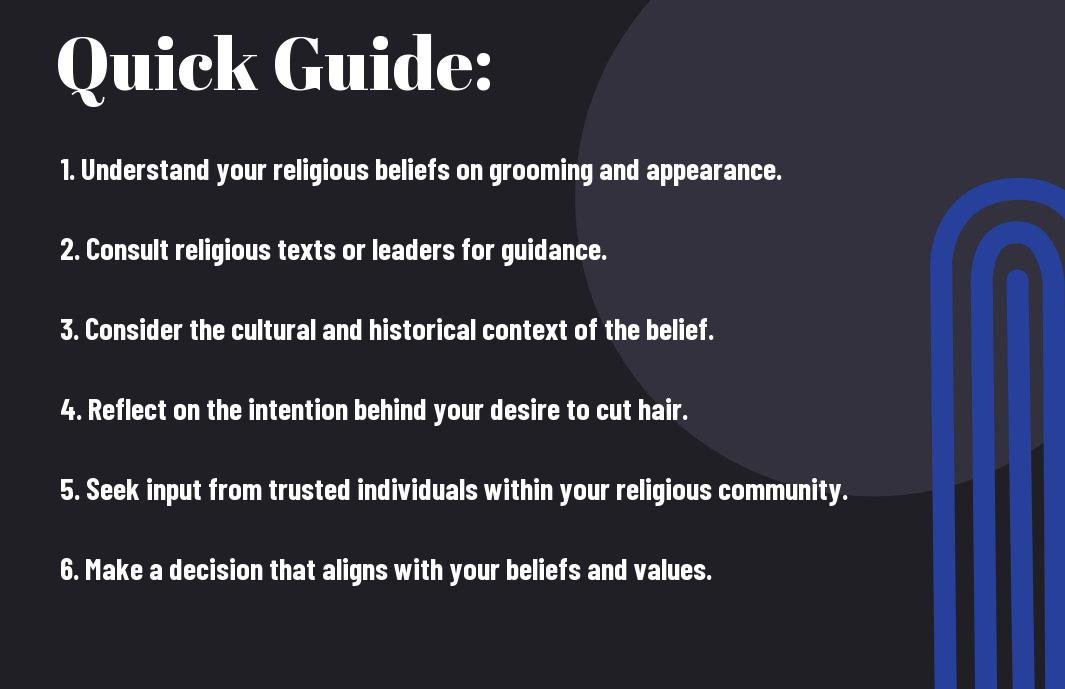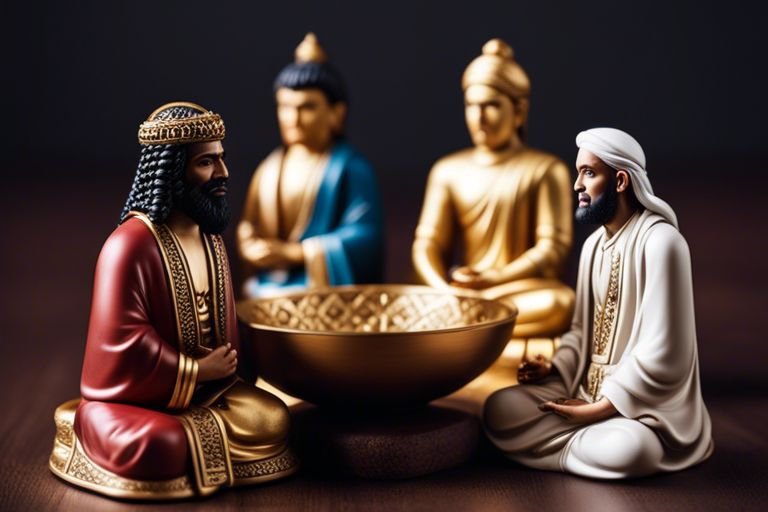Indubitably, the topic of grooming and appearance has always been a subject of religious debate and discussion. From long hair to beards, tattoos to piercings, different religious traditions have varying perspectives on what is considered appropriate and respectful in terms of personal appearance. In this guide, I will explore the religious views on cutting hair, addressing the potential sinful nature of this common grooming practice, and what different faiths say about altering one’s physical appearance. By the end of this post, you will have a better understanding of how various religions approach the act of cutting hair, and how it pertains to modern day discussions about personal grooming and individual expression.
Key Takeaways:
- Religious beliefs vary on the permissibility of cutting hair, with some traditions viewing it as a sin while others do not consider it a religious issue at all.
- Grooming and appearance are deeply connected to spiritual and cultural identity, with individual interpretations of religious texts and teachings influencing personal choices on hair and grooming practices.
- Historical and cultural context plays a significant role in shaping religious perspectives on hair and grooming practices, with traditions evolving over time to reflect shifting attitudes and values.
- Respect for individual autonomy and self-expression is an important consideration in navigating religious beliefs on hair and appearance, acknowledging the diversity of personal beliefs and practices within a religious community.
- Interfaith dialogue and understanding are crucial for fostering respect and empathy towards diverse religious perspectives on hair and grooming practices, promoting harmony and unity within communities.
Religious Perspectives on Grooming and Appearance
To understand the role of hair grooming in religious perspectives, it is essential to examine the various faiths and their teachings on personal appearance and maintenance. In many religions, personal grooming is not just a matter of aesthetics, but a deeply spiritual practice that reflects one’s commitment to their faith.
Types of Religious Practices Related to Hair Grooming
When it comes to hair grooming, different religious traditions have their own set of guidelines and practices. In Islam, for example, men are encouraged to grow beards and keep their hair neat and clean, while in Sikhism, both men and women are required to keep their hair uncut and covered. In Judaism, men often grow beards and side locks, while women cover their hair after marriage. Christianity also has various traditions and customs when it comes to hair grooming including the Amish tradition of men growing beards but not mustaches. Thou how one should groom their hair in the context of their religion varies, the underlying message is the same – maintaining purity and respect for one’s body as an extension of the divine.
Tips for Respecting Religious Grooming Guidelines
Respecting religious grooming guidelines requires sensitivity and understanding. When interacting with individuals from different faiths, it is important to be mindful of their cultural and religious practices. Any changes to your grooming routine should be made with respect and consideration for those around you, and with a commitment to embracing diversity and inclusivity.
Step-by-Step Guide for Following Religious Grooming Practices
Understanding and following religious grooming practices can be complex, but with the right guidance, it is possible to navigate the nuances of different faith traditions. Through careful research and open communication with religious leaders or knowledgeable individuals, you can gain a deeper understanding of the significance of hair grooming in various religious contexts, as well as gain insight into the specific steps to incorporate them into your own routine.
Factors to Consider When Deciding on Hair Grooming Practices
When considering your own hair grooming practices in the context of different religious traditions, it’s important to consider the impact on your personal identity, as well as the respect for the beliefs of others. Any decisions about how to groom your hair should come from a place of deep consideration and respect for the religious and cultural beliefs that shape your relationships and interactions with others.
The Pros and Cons of Adhering to Religious Grooming Standards
Adhering to religious grooming standards comes with its own set of pros and cons. While it can foster a deep sense of connection to one’s faith and community, it may also bring about misunderstanding and judgment from those outside of the religious tradition. It is important to weigh these factors carefully and make the choice that aligns with your personal values and beliefs.

Is Cutting Your Hair a Sin – Exploring Religious Perspectives on Grooming and Appearance
Hence, after exploring the religious perspectives on grooming and appearance, it is evident that the matter of cutting one’s hair is subjective and varies across different faith traditions. While some religions may view it as a sin, others consider it a part of routine grooming and maintenance. Ultimately, it is important to consider one’s own religious beliefs and teachings when making decisions about personal grooming practices. It is important to respect and understand the diversity of beliefs and practices within different faith traditions, and to approach the topic with an open mind and a willingness to learn from and appreciate the perspectives of others.
FAQ
Q: Is it a Sin to Cut Your Hair According to Religious Perspectives?
A: The perspective on cutting hair varies across different religions. It is not considered a sin in some religions, while in others, the significance of hair may affect the beliefs surrounding hair cutting. Consult your religious leaders or scriptures for specific guidance.
Q: What Does the Bible Say About Cutting Hair?
A: The Bible does not explicitly forbid cutting hair, but it does mention specific guidelines for hair length and grooming in certain contexts. It is important to interpret these passages in their historical and cultural context, and seek guidance from religious leaders for a modern understanding.
Q: What Does Islam Say About Cutting Hair?
A: In Islam, cutting hair is considered a part of personal grooming and is permitted. However, there are specific guidelines for hair length and grooming for both men and women. These guidelines are based on teachings from the Quran and Hadith and may vary across different Islamic traditions.
Q: What is the Perspective on Cutting Hair in Hinduism?
A: In Hinduism, hair is considered sacred and is often left uncut as a symbol of spirituality and surrender to the divine. However, there are also specific rituals and occasions where hair cutting is encouraged or required, such as during certain ceremonies or as a form of devotion to a deity.
Q: How Can I Respect Religious Perspectives on Hair Cutting?
A: To respect religious perspectives on hair cutting, it is important to understand and appreciate the significance of hair in different traditions. This may involve seeking guidance from religious leaders, participating in cultural and religious ceremonies, and showing sensitivity and understanding towards the beliefs of others. Remember that religious practices are deeply personal and may vary among individuals within the same faith. Respect and open-mindedness are key in navigating this complex and diverse topic.











